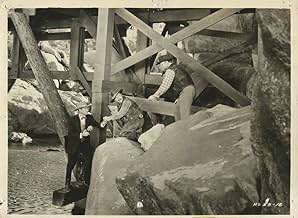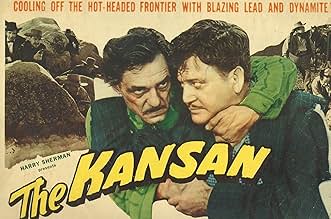A cowboy injured fighting bank robbers awakens to find he's the new marshal. He faces off against the corrupt town banker who's exploiting the locals.A cowboy injured fighting bank robbers awakens to find he's the new marshal. He faces off against the corrupt town banker who's exploiting the locals.A cowboy injured fighting bank robbers awakens to find he's the new marshal. He faces off against the corrupt town banker who's exploiting the locals.
- Nominated for 1 Oscar
- 1 nomination total
Ray Bennett
- Messenger
- (as Raphael Bennett)
Gertrude Astor
- Blonde Townswoman
- (uncredited)
Walter Baldwin
- Judge Lorrimer
- (uncredited)
Ted Billings
- Barfly
- (uncredited)
- Director
- Writers
- All cast & crew
- Production, box office & more at IMDbPro
Featured reviews
Wild Pacing with a lot of Western Movie Ingredients Paraded out for WWII Movie Audiences. Explosives, Gun Battles with many Shooters On both sides, a Sprawling Saloon Brawl that is a Stuntman's Showcase, Cattle Stampede, and more Outlandish Outdoor Shenanigans.
The Wartime Audiences sure got Their Money's Worth with this one. An Aging Richard Dix Shows Heroics, Honor, and Precise Marksmanship, although He is Nicked by incoming Bullets at least Five Times. Albert Dekker is a Dandy Villain and Victor Jory is on hand as an Ambiguous Mysterious Player in all the doings. It's Never Certain where He Stands and that Adds a bit of Intrigue.
Jane Wyatt just Sparkles on screen and is Cute. Overall, a Rousing, Never Boring, Wide Open Western that is Entertaining. Willie Best will Certainly get Noticed as a Racial Stereotype and Comedy Relief, but is shown Respect by the "Good Guys".
Note...There is a Propaganda insertion ("When Johnny Comes Marching Home Again") as WWII was raging on, to boost morale. A musical number that was popular during the Civil War it is here delivered by leggy George Cohan types.
Note 2 The Print shown on TCM in 2015 was washed out and pretty shoddy. One assumes it is the best available. There is no contrast and it has a white-washed look. If it is the best out there, Film-Restorists-Archivists should be on the look out for better source material.
The Wartime Audiences sure got Their Money's Worth with this one. An Aging Richard Dix Shows Heroics, Honor, and Precise Marksmanship, although He is Nicked by incoming Bullets at least Five Times. Albert Dekker is a Dandy Villain and Victor Jory is on hand as an Ambiguous Mysterious Player in all the doings. It's Never Certain where He Stands and that Adds a bit of Intrigue.
Jane Wyatt just Sparkles on screen and is Cute. Overall, a Rousing, Never Boring, Wide Open Western that is Entertaining. Willie Best will Certainly get Noticed as a Racial Stereotype and Comedy Relief, but is shown Respect by the "Good Guys".
Note...There is a Propaganda insertion ("When Johnny Comes Marching Home Again") as WWII was raging on, to boost morale. A musical number that was popular during the Civil War it is here delivered by leggy George Cohan types.
Note 2 The Print shown on TCM in 2015 was washed out and pretty shoddy. One assumes it is the best available. There is no contrast and it has a white-washed look. If it is the best out there, Film-Restorists-Archivists should be on the look out for better source material.
No need to recap the plot. Though conventional in most respects, this western does have some imaginative wrinkles. The Victor Jory character (Jeff) is a real novelty for the western format. Unlike most oaters, we can't tell where his loyalties lie. His intentions remain something of an enigma, which adds greatly to the plot since we can't be sure what he'll do next. With his unusual looks, Jory is perfectly cast. Then there's the super slick Albert Dekker who uses his extraordinary business guile instead of a six-gun to take over the town. All in all, it's a fine cast of colorful movie veterans, especially the froggish Eugene Palette.
I get the feeling someone in production was aiming for an epic scale western. Consider features like the host of extras, the big shootouts, the massive barroom free-for-all, the cattle stampede that's not all stock shots, along with the well-mounted musical numbers. The trouble is they spent all their money on big events but filmed in the very un-epic LA area scrublands, which gives the visuals a flat, pedestrian appearance. The story may be grandly conceived but the canvas is ordinary, at best. All in all, it's an interesting, slightly offbeat western.
I get the feeling someone in production was aiming for an epic scale western. Consider features like the host of extras, the big shootouts, the massive barroom free-for-all, the cattle stampede that's not all stock shots, along with the well-mounted musical numbers. The trouble is they spent all their money on big events but filmed in the very un-epic LA area scrublands, which gives the visuals a flat, pedestrian appearance. The story may be grandly conceived but the canvas is ordinary, at best. All in all, it's an interesting, slightly offbeat western.
Richard Dix finds himself elected sheriff of a small town run by land baron Albert Dekker after helping foil a robbery in this B-Western from the '40s. Dekker's the one who had him elected in the expectation that he would become just another of his puppets - but this is Dickie Dix we're talking about, and he's not about to be any man's doormat, even if he does look a little careworn at this stage of his career (death from heart attack was only 6 years away). The widely under-praised Victor Jory plays Dekker's brother, a gambler whose uncertain allegiance to either side makes him by far the film's most interesting character.
The producing/directing team of Harry Sherman and George Archaimbaud who turned out a couple dozen Hopalong Cassidy movies moved away from Hoppy and the Bar 20 to give us The Kansan, an independent film from United Artists. This western stars Richard Dix as the Shane like character who takes a hand in stopping a bank robbery by the notorious James gang. Dix gets good and shot up for his troubles, but while he's on the mend he finds he's been elected town marshal.
Engineering his election is town banker Albert Dekker who has many interests, legal and extralegal and he'd like a gun-hand like Dix as marshal to look after those interests. Dekker has cause for regret as Dix takes the job very seriously. Dix also starts courting Jane Wyatt the local innkeeper.
That doesn't sit well with Victor Jory who is Dekker's brother. But Jory plays a lone hand in life as the film unfolds.
Dix's best years on screen were way behind him when he did The Kansan, but he could and does contribute a solid western characterization and gets solid support from the cast. Eugene Palette as a visiting cattle baron looks a bit lost in the western garb, but he works through it.
Western fans will recognize some distinct plot elements the Cecil B. DeMille classic Union Pacific. If you do you know exactly how The Kansan will end.
Engineering his election is town banker Albert Dekker who has many interests, legal and extralegal and he'd like a gun-hand like Dix as marshal to look after those interests. Dekker has cause for regret as Dix takes the job very seriously. Dix also starts courting Jane Wyatt the local innkeeper.
That doesn't sit well with Victor Jory who is Dekker's brother. But Jory plays a lone hand in life as the film unfolds.
Dix's best years on screen were way behind him when he did The Kansan, but he could and does contribute a solid western characterization and gets solid support from the cast. Eugene Palette as a visiting cattle baron looks a bit lost in the western garb, but he works through it.
Western fans will recognize some distinct plot elements the Cecil B. DeMille classic Union Pacific. If you do you know exactly how The Kansan will end.
This probably doesn't deserve the "B Movie" sobriquet. The production values are pretty high and it is quite heavy on the movie stars. This looks to me like it would have taken the A spot on a bill. Dix is good but Victor Jory nearly steals the show. The high point is likely one of the most over-the-top barroom brawls I've ever seen on celluloid. The script is also fine, although nothing too original. The low point in the movie....aside from a really unfortunate racial caricature.... is probably represented by a really ghastly World War II style showgirl routine based around "When Johnny Comes Marching Home". All in all, a satisfying show.
Did you know
- TriviaFilm debut of Lorraine Clark.
- Quotes
Josh Hudkins: [to Bonniwell] Marshal, I'm the mayor here. Aren't you overstepping your authority?
- ConnectionsFeatured in Doctor Who: The Tenth Planet: Episode 2 (1966)
Details
- Runtime
- 1h 19m(79 min)
- Color
- Aspect ratio
- 1.37 : 1
Contribute to this page
Suggest an edit or add missing content








































